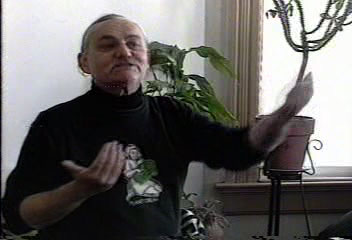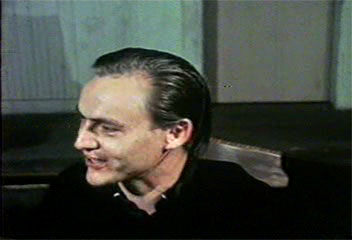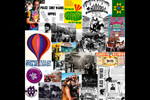|



| |
Diggerly Do: Free Store as "Life Acting" and "Create the Condition You Describe"
Digger frame of reference for creating a social movement
|
|
The Diggers created a new form of revolutionary action, what they called
"life acting" which they introduced in the manifesto Trip Without a
Ticket, written in 1966. This pamphlet described the Free Store which
the Diggers had invented that Fall in which all goods and services were free
of charge. "No owner, no Manager, no employees and no cash-register. A
salesman in a free store is a life-actor." In one of the street sheets that
were collectively known as the Digger Papers, the concept of life acts was
introduced: "Life acts! Acts that can create the condition of life they
describe! ... No frozen moments re-enacted for tomorrow's fantasy
revolution. Life-acting is freeing eternity in now!"
"Create the Condition You Describe" became the model for Digger events
and actions, always looking to "enact tomorrow's fantasy revolution." The
Digger concept of life acting is what anarchists would later term "prefigurative
politics in which certain political ideals are experimentally actualized in
the 'here and now' rather than hoped to be realized in the distant future."
[van de Sande 2013] The anarchist theoretician David Graeber argues that
"these new tactics are perfectly in accord with the general anarchistic
inspiration of the movement, which is less about seizing state power than
about exposing, delegitimizing and dismantling mechanisms of rule while
winning ever-larger spaces of autonomy from it. ... Their ideology,
then, is immanent in the anti-authoritarian principles that underlie their
practice..." [Graeber, "The New Anarchists," 2002, emphasis added]
The Digger practice of "life acting" would become the prefigurative
politics of 21st century anarchism. |

Peter Berg in the 1998 interview by Celine Deransart and Alice Gaillard for the
film Les Diggers de San Francisco.

Peter in a theatre workshop at the San Francisco Mime Troupe studio in
1966. He wrote and acted in many of the Troupe productions from 1965 to
1967. In October, 1966, he wrote Trip Without A Ticket,
published as an anonymous Digger manifesto.
|
"Free Store Rap"
(as narrated by Peter Berg from
the film Les Diggers de San Francisco,
English version)
This two-minute video clip opens with Peter reading from Trip Without A Ticket then
discussing the concepts of life acting and "Create the Condition You
Describe"
|
Transcription of Peter's comments. (I had asked if anyone would be
interested in transcribing this clip, and lo the same day within a few
hours, one of the Digger angels sent me the following:)
[Reading an excerpt from Trip Without A Ticket:]
The Diggers are hip to property. Everything is free, do your own
thing. Human beings are the means of exchange. Food, machines, clothing,
materials, shelter and props are simply there. Stuff. A perfect dispenser
would be an open Automat on the street. Locks are time-consuming.
Combinations are clocks.
So a store of goods or clinic or restaurant that is free becomes
a social art form. Ticketless theater. Out of money and control.
Diggers assume free stores to liberate human nature. First free
the space, goods and services. Let theories of economics follow social
facts. Once a free store is assumed, human wanting and giving, needing and
taking, become wide open to improvisation.
A sign: If Someone Asks to See the Manager Tell Him He's the
Manager.
[...]
A basket labeled Free Money.
No owner, no Manager, no employees and no cash-register. A
salesman in a free store is a life-actor.
[End of reading from excerpt]
And it hit me…thclik, oiiiinnnggggg [strikes
forehead]...you know, this is life acting...is you create the condition
you describe, and if we’re lucky, the condition lasts for a long time.
And if it isn’t, well at least we tried. And there were people that
didn’t get it. I mean there were people that you would give Free Money
to, and they wouldn’t get it. Or sometimes social critics said we were
Robin Hoods, that we were taking from the rich and giving to the poor.
That isn’t what we were doing. I mean we got things from all sorts of
sources, and that was 'magical'. But, what we did with it, was to create
a theatre that described everything being Free, hoping that that would
lead to a social movement. <<==>>
|
|

